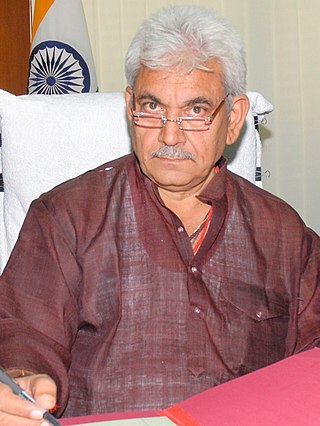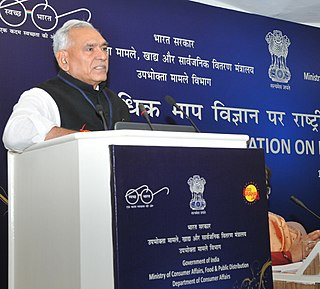Related Research Articles

G. K. Vasan is an Indian Politician and son of G. K Moopanar, a veteran Indian National Congress Leader. G K Vasan is currently the president of Tamil Maanila Congress (M), a political party in the state of Tamil Nadu, India. He was a member of Rajya Sabha, an upper house of Indian Parliament from the year 2002 until 2014. During his tenure as a Member of Indian Parliament, he had functioned in several positions in the Union Government under UPA 1 & UPA II regime including as a Minister of State for Ministry of Statistics & Programme Implementation from Jan 2006 – May 2009; Union Minister of Shipping from May 2009 – May 2014 and as an In-charge Minister for Labour from January 2014 - April 2014.

The Comptroller and Auditor General of India is the supreme audit institution of India, established under Article 148 of the Constitution of India. They are empowered to audit all receipts and expenditure of the Government of India and the State Governments, including those of autonomous bodies and corporations substantially financed by the government. The CAG is also the statutory auditor of Government-owned corporations and conducts supplementary audit of government companies in which the government has an equity share of at least 51 percent or subsidiary companies of existing government companies. The CAG is also the statutory auditor of the Lokpal.
Mahatma Gandhi National Rural Employment Guarantee Act 2005 or MGNREGA, earlier known as the National Rural Employment Guarantee Act or NREGA, is an Indian social welfare measure that aims to guarantee the 'right to work'. This act was passed on 23 August 2005 and was implemented in February 2006 under the UPA government of Prime Minister Manmohan Singh following tabling of the bill in parliament by the Minister for Rural Development Raghuvansh Prasad Singh.
The Sampoorna Grameen Rozgar Yojana was a scheme launched by the Government of India to gain the objective of providing gainful employment for the rural poor. From 21 February 2003, EAS became an allocation-based scheme. The programme was implemented through the Panchayati Raj institutions.

Boianapalli Vinod Kumar is an Indian politician and former Member of Parliament, he served as Vice-chairman of Telangana State Planning Board (2019-2023). He represented the Karimnagar constituency of Telangana State in the 16th Lok Sabha (2014-2019) and Hanamkonda constituency in the 14th Lok Sabha (2004-2009). He is one of the founding members of the Telangana Rashtra Samithi (TRS) party and is presently a politburo member and served as party's deputy Floor Leader in the 16th Lok Sabha.

Marpadi Veerappa Moily is an Indian politician belonging to the Indian National Congress from the state of Karnataka. Moily was the former Chief Minister of the Indian state of Karnataka.

Manoj Sinha is an Indian politician serving as the 2nd and the current lieutenant governor of Jammu and Kashmir. He served as the minister of state for Communications and minister of state for Railways in the government of India. Sinha was elected as member of parliament in the Lok Sabha, representing Ghazipur parliamentary constituency for three terms from the Bharatiya Janata Party. Sinha was in the race for the post of UP chief minister after 2017 Uttar Pradesh Legislative Assembly election.

Vinod Rai is a former IAS officer who served as the 11th Comptroller and Auditor General of India. He assumed office on 7 January 2008 till 22 May 2013. He is the current chairman of UN Panel of External Auditors and Honorary Advisor to the Indian Railways and a member of the Railway Kaya Kalp Council.
The National Pension System (NPS) is a defined-contribution pension system in India regulated by the Pension Fund Regulatory and Development Authority (PFRDA) which is under the jurisdiction of the Ministry of Finance of the Government of India. National Pension System Trust was established by PFRDA as per the provisions of the Indian Trusts Act of 1882 to take care of the assets and funds under this scheme for the best interest of the subscriber.
DIAL Scam, also called Delhi Airport Land Scam, Airport Scam and the IGI Scam is a title popularly used in the media to refer to the irregularities pointed out in a report titled Implementation of Public – Private Partnership at Indira Gandhi International Airport, Delhi tabled on 17 August 2012 by the Comptroller and Auditor General of India (CAG). According to this report, 1.63 lakh crore was lost by the Indian exchequer due to a deal entered between the Airports Authority of India and DIAL for the lease of land.
Uma Saren is an Indian politician who has been a Member of Lok Sabha for Jhargram since 2014. She belongs to Trinamool Congress. A medical practitioner by profession, she is the first person to speak in the Santali language in the Inter-Parliamentary Union.

Chhotu Ram Chaudhary better known as C.R. Chaudhary is an Indian politician and a retired IAS officer who served as member of 16th Lok Sabha, the lower house of the Indian Parliament. He is a member of the Bharatiya Janata Party. He won 2014 Indian general elections from the Nagaur Constituency in Rajasthan. He is currently president of Rajasthan Kisan Aayog since March 2024. He served as Minister of State of the Department of Consumer Affairs, Food and Public Distribution. In the cabinet expansion of September 2017, he was also named Minister of State for the Ministry of Commence and Industry. He started career as College Lecturer in Government College Sirohi, Dausa and Ajmer from 1971–1977. He is also a Retd. IAS and Ex- Chairman of Rajasthan Public Service Commission from 2006–2010.
Shrikant Eknath Shinde is an Indian politician serving as a member of Parliament in the Lok Sabha. He represents the Kalyan constituency of Maharashtra and is a member of the Shiv Sena political party.
Sansad Adarsh Gram Yojana is a rural development programme broadly focusing upon the development in the villages which includes social development, cultural development and spread motivation among the people on social mobilization of the village community. The programme was launched by the Prime Minister of India, Narendra Modi on the birth anniversary of Jayaprakash Narayan, on 11 October 2014.

Atal Mission for Rejuvenation and Urban Transformation (AMRUT) is a development mission launched by Prime Minister of India Narendra Modi in June 2015 with the focus to establish infrastructure that could ensure adequate robust sewage networks and water supply for urban transformation by implementing urban revival projects. Rajasthan was the first state in the country to submit State Annual Action Plan under Atal Mission for Rejuvenation and Urban Transformation (AMRUT). The scheme Housing for All by 2022 and Atal Mission for Rejuvenation and Urban Transformation (AMRUT) were launched on the same day. The scheme is dependent with public–private partnership (PPP) model. If required, various other schemes like Swachh Bharat Mission, Housing for All 2022, along with the local state schemes like that related to water supply and sewerage and other infrastructure related schemes can be linked to AMRUT.

The Second K. Chandrashekar Rao ministry was the highest decision-making body of executive branch of the Government of Telangana, headed by the Chief Minister of Telangana.
The Prime Minister's Citizen Assistance and Relief in Emergency Situations Fund was created on 27 March 2020, following the COVID-19 pandemic in India. Although it is named for the Prime Minister of India, and uses the State Emblem of India, it is a private fund, used at the discretion of the Prime Minister and the Fund's trustees, and does not form a part of the Government of India's accounts. The Fund was established for the purpose of redressing the COVID-19 pandemic in India, in 2020. While complete documentation for the Fund's establishment has not been made public, the Government of India has stated that the Prime Minister of India, Narendra Modi, is the chairman of the fund, and that trustees include the Minister of Defence, Rajnath Singh; the Minister of Home Affairs, Amit Shah, the Minister of Finance, Nirmala Sitharaman, and several corporate leaders and industrialists, including Ratan Tata, and Sudha Murty.
Old Pension Scheme (OPS) in India was abolished as a part of pension reforms by Union Government. Repealed from 1 January 2004, it had a defined-benefit (DB) pension of half the Last Pay Drawn (LPD) at the time of retirement along with components like Dearness Allowances (DA) etc. OPS was an unfunded pension scheme financed on a pay-as-you-go (PAYG) basis in which current revenues of the government funded the pension benefit for its retired employees. Old Pension Scheme was replaced by a restructured defined-contribution (DC) pension scheme called the National Pension System.
Political funding in India is a major concern under need for electoral reforms in India. The financing of the world's most extensive electoral process remains a perplexing issue, as the involvement of businesses in supporting both disclosed and undisclosed expenditures during elections has been a matter of public knowledge for a considerable period.
References
- ↑ Government of India. En/2011-summary-statement-offund-release.aspx "mplads.gov. 2018. Summary statement of funds release".
{{cite web}}: Check|url=value (help) - ↑ Government of India. En/2015-summary-reports.aspx "mplads.gov. 2018. Statewise details of expenditure".
{{cite web}}: Check|url=value (help) - ↑ Government of India. AuthenticatedPages/Reports/ Citizen/ rptCMSStateWiseSummaryOfWork.aspx "mplads.gov. 2018. Statewise summary of work details".
{{cite web}}: Check|url=value (help) - ↑ Indian express http://www.indianexpress.com/news/innovator-win-rs-2-lakh-from-your-mp/954809
- ↑ PIB http://pib.nic.in/newsite/erelease.aspx?relid=84509
- ↑ Blair, H. 2017. Constituency development funds in India: Do they invite a political business cycle? Economic & Political Weekly LII(31):99-105
- ↑ Comptroller and Auditor General of India. audit_report_files/ Union_Performance_Local_area_Develo pment_Scheme_31_2010.pdf "cag.gov. 2011. Report No. 31 of 2010- Performance Audit of Civil on Member of Parliament Local Area Development Scheme" (PDF).
{{cite web}}: Check|url=value (help)